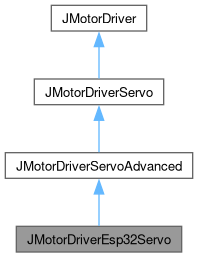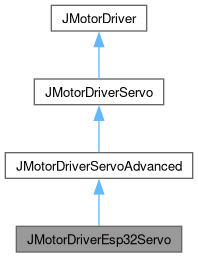For servos and motor controllers that use servo signals (ESCs) More...
#include <JMotorDriverEsp32Servo.h>


Public Member Functions | |
| JMotorDriverEsp32Servo (byte _pwmChannel, byte _servoPin, int _freq=50, int _resBits=14, int _minServoValue=544, int _maxServoValue=2400, bool _constrainRange=true) | |
| constructor, sets pins, custom frequency and resolution optional | |
| void | adjustFrequency (float freq=1.0) |
| helper function for adjusting the frequency that the servo signal pulse is repeated at For some servos this can be used to adjust the strength of the servo ( <1.0 makes it weaker) | |
| float | setFrequencyAndResolution (int freq=50, int resBits=14) |
| set frequency that servo signal pulse is repeated at and how many bits are used internally for resolution | |
| bool | set (float _val) |
| set motor power | |
| bool | setEnable (bool _enable) |
| use to enable or disable a motor, and sets up pin states | |
| bool | getEnable () |
| get the enable state of the driver | |
| float | getMaxRange () |
| high end of the range | |
| float | getMinRange () |
| low end of the range | |
 Public Member Functions inherited from JMotorDriverServo Public Member Functions inherited from JMotorDriverServo | |
| void | setMinServoValue (int value) |
| microseconds for shortest servo pulse | |
| void | setMaxServoValue (int value) |
| microseconds for longest servo pulse | |
| int | getMinServoValue () |
| returns setting for microseconds for shortest servo pulse | |
| int | getMaxServoValue () |
| returns setting for microseconds for longest servo pulse | |
| int | getServoValueRange () |
| returns difference (in microseconds) between longest and shortest servo pulse settings | |
| void | setServoValues (int min, int max) |
| set the settings for short and long servo pulses at the same time | |
| int | getSetMicroseconds () |
| returns how many microseconds the servo signal pulse was most recently set to | |
| bool | getConstrainRange () |
| returns whether the range of set() will be constrained to within -1 and 1 | |
| void | setConstrainRange (bool _constrainRange) |
| set whether the range of set() will be constrained to within -1 and 1 | |
 Public Member Functions inherited from JMotorDriver Public Member Functions inherited from JMotorDriver | |
| bool | enable () |
| enable motor | |
| bool | disable () |
| disable motor | |
Additional Inherited Members | |
 Protected Attributes inherited from JMotorDriverServo Protected Attributes inherited from JMotorDriverServo | |
| int | minServoValue |
| int | maxServoValue |
| int | setMicroseconds = 0 |
| bool | constrainRange |
Detailed Description
For servos and motor controllers that use servo signals (ESCs)
- Note
- platform: ESP32
Constructor & Destructor Documentation
◆ JMotorDriverEsp32Servo()
|
inline |
constructor, sets pins, custom frequency and resolution optional
- Parameters
-
_pwmChannel ledc channel (must be unique for each driver) _servoPin pin to output signal on _freq = 50: Hz (default 50) must be <= int(80E6 / 2^resBits) _resBits = 14: (default 14) tradeoff with max available frequency _minServoValue (int) minimum servo pulse, default: 544 microseconds _maxServoValue (int) maximum servo pulse, default: 2400 microseconds _constrainRange (bool) constrain range of set() to within -1 and 1, default: true
Member Function Documentation
◆ adjustFrequency()
|
inlinevirtual |
helper function for adjusting the frequency that the servo signal pulse is repeated at For some servos this can be used to adjust the strength of the servo ( <1.0 makes it weaker)
- Parameters
-
freq default 1.0, freq*50 is sent to setFrequencyAndResolution
Implements JMotorDriverServoAdvanced.
◆ getEnable()
|
inlinevirtual |
get the enable state of the driver
- Return values
-
(bool) true if enabled, false if disabled
Reimplemented from JMotorDriver.
◆ getMaxRange()
|
inlinevirtual |
high end of the range
- Note
- usually 1.0
- Return values
-
(float) maxRange
Reimplemented from JMotorDriver.
◆ getMinRange()
|
inlinevirtual |
low end of the range
- Note
- usually -1.0, if 0, that indicates a motor controller with no reverse function
- Return values
-
(float) minRange
Reimplemented from JMotorDriver.
◆ set()
|
inlinevirtual |
set motor power
- Note
- val should be between getMinRange and getMaxRange, but constrained internally
- Parameters
-
val (float) val
- Return values
-
(bool) false if at end of power range, true otherwise
Reimplemented from JMotorDriver.
◆ setEnable()
|
inlinevirtual |
use to enable or disable a motor, and sets up pin states
- Note
- setEnable(true) must be called before a motor driver will activate
- Parameters
-
_enable (bool) true=enable, false=disable
- Return values
-
(bool) true if state changed, false if state already set
Reimplemented from JMotorDriver.
◆ setFrequencyAndResolution()
|
inline |
set frequency that servo signal pulse is repeated at and how many bits are used internally for resolution
- Parameters
-
freq Hz (default 50) resBits (default 14) tradeoff with max available frequency
- Return values
-
(float) returns PWM cycles per microsecond-used in ledcWrite call, returned for debugging purposes
The documentation for this class was generated from the following file:
- src/JMotorDriver/JMotorDriverEsp32Servo.h